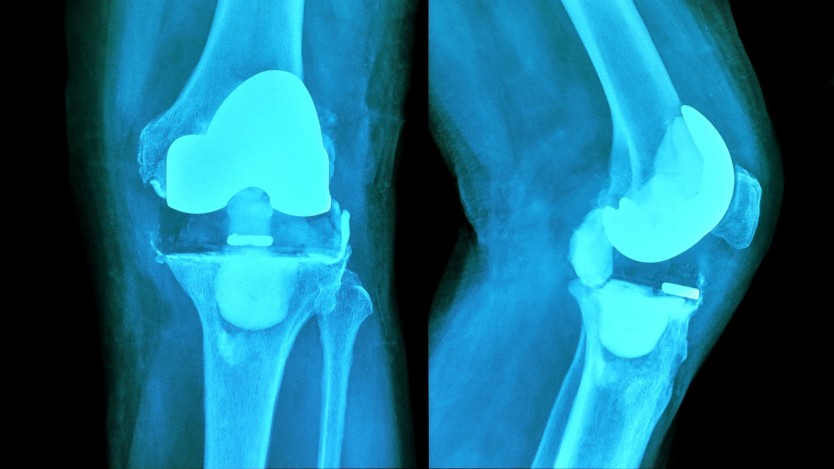Titanium knee prosthesis

- What is a knee prosthesis?
- What prior considerations are necessary for the implantation of a titanium knee prosthesis?
- Which patients are suitable for the implantation of a titanium knee prosthesis?
- What is a suitable titanium total knee replacement?
- What materials are used to make a knee prosthesis?
What is a knee prosthesis?
- Titanium knee replacements are the most common today, although other types of alloys such as cobalt-chromium or Vitalium are also available.
- Titanium knee replacements last approximately 20 to 25 years, although in some cases they have lasted longer.
- Any type of knee prosthesis, including titanium, must comply with the rest of the joint components in terms of mobility, stability and functionality when implanted.
Total knee replacement is the artificial replacement of almost all the components of the knee in its three compartments. This replacement is produced by implanting metallic components (titanium or chrome-cobalt alloy components) and an ultra high-density polyethylene surface.
The titanium or other composite knee prosthesis consists of a femoral condyle, a tibial condyle, an articular plate or insert and covering of the articular faces of the knee.

Do you need knee replacement surgery?
Request a free and immediate appointment with our specialists in Traumatology
What prior considerations are necessary for the implantation of a titanium knee prosthesis?
The implantation of a knee prosthesis made of titanium or any other alloy or material is one of the most frequent and safest surgical procedures in the field of traumatology.
In order to ensure the correct positioning of the titanium knee prosthesis, an adequate development of the intervention and a successful outcome for the patient, there must be an adequate selection of the patient, choosing the right implant according to a series of considerations that will be explained in the following points, and an early and individualised recovery according to the characteristics of each patient.
Which patients are suitable for the implantation of a titanium knee prosthesis?
The appropriate selection of patients for titanium knee replacement must meet a number of determining factors to ensure the appropriateness of the surgical procedure. These factors are:
- Patient age: 60 years of age is generally considered to be the age limit beyond which the possibility of titanium knee replacement can be assessed. This age limit is not a mandatory requirement but a recommendation based on the average life of current prostheses and the possibility of reoperation. The average age of titanium knee replacements is between 20 and 25 years.
- Severe structural damage: In this regard, it is considered necessary to be certain of advanced and predominant internal structural damage, usually caused by chronic wear processes such as osteoarthrosis.
- Severe accompanying symptomatology: based on the presence of pain, functional impotence and moderate or severe limitation of quality of life that does not improve with pharmacological treatments or with infiltrations of visco-supplementary solutions or regenerative cells.
What is a suitable titanium total knee replacement?
A suitable titanium knee prosthesis, or what is referred to as a suitable prosthesis, is one that adapts to and replaces the functions of the natural components of the knee to the greatest extent possible.
In order for a titanium knee prosthesis to be considered suitable, it must fulfil the following characteristics: mobility (kinematic function), fixation (ability to remain immobile with respect to the bone structures to which it is to be anchored) and wear (ability to perform the greatest possible number of movements with the least possible deterioration of the material from which it is made).
Thus, we can conclude that an ideal knee prosthesis made of titanium, or any other material, should allow the prosthetic components to be positioned on the faces of the knee joint, should have mobility and stability compatible with the soft tissues of the knee, and should allow adequate function for activities of daily living.

What materials are used to make a knee prosthesis?
The materials used in the manufacture of knee replacements have not changed substantially from those used 15-20 years ago. Throughout the development of this surgical technique, theories combining chemical and physical principles have been tested and discarded in search of the best materials to make any knee prosthesis, but the use of many of them has been discarded mainly due to problems of durability and functionality.
In general, we can predefine a predefined type of material for each of the components that make up the knee prosthesis:
- Knee joint surfaces: Vitallium (a mixture of 30% chromium, 7% molybdenum and a mixture of cobalt, nickel and other materials...).
- Femoral component of the knee prosthesis usually uses 2 types of elements: a cobalt super-alloy or a titanium alloy known as Ti6AI4V.
- Tibial component of the knee prosthesis: primarily cobalt-chromium alloy, followed by the titanium alloy discussed above.
- Insert: polyethylene as a mixture of high-strength plastic components that provides the possibility of flexion, extension and rotation of the femoral component on the tibial component.
Regardless of the classification of materials and the generalities discussed above, it should be noted and remembered that there are a large number of different types of titanium knee prostheses and other components on the market.
These different types of knee prostheses vary and are adapted to the needs of each patient, to the underlying pathology as the determining cause of the degeneration of the joint and to the condition of the bone elements on which the knee prosthesis is to rest.

If we talk about the materials from which knee prostheses are made, we can define titanium alloy as the most biocompatible material with the tissues that make up the knee. This nature of titanium gives it the possibility of being the material that shows the least reaction to the surrounding organic tissues.
On the other hand, titanium and its alloy is one of the materials that shows the most appropriate hardness and flexibility ratio to form part of a knee prosthesis, achieving the capacity to resist the forces that are exerted on the knee joint and the possibility of adapting to the bone components on which it will rest to form the prosthesis.
If we compare titanium alloy with chromium-cobalt alloy, we find one main difference between the two. The titanium alloy has a rougher surface. This characteristic means that, compared to the chrome-cobalt alloy, there is more wear in the long term due to the friction between the different femoral and tibial components.
In any case, the choice of one or the other material will depend on the characteristics of each patient and the prosthesis that best suits them.

Assess your knee problem with our surgeon
Request a free and immediate surgical consultation with our specialists in knee replacement.
Medical disclaimer: All the published content in Operarme is intended to disseminate reliable medical information to the general public, and is reviewed by healthcare professionals. In any case should this information be used to perform a diagnosis, indicate a treatment, or replace the medical assessment of a professional in a face to face consultation. Find more information in the links below:
